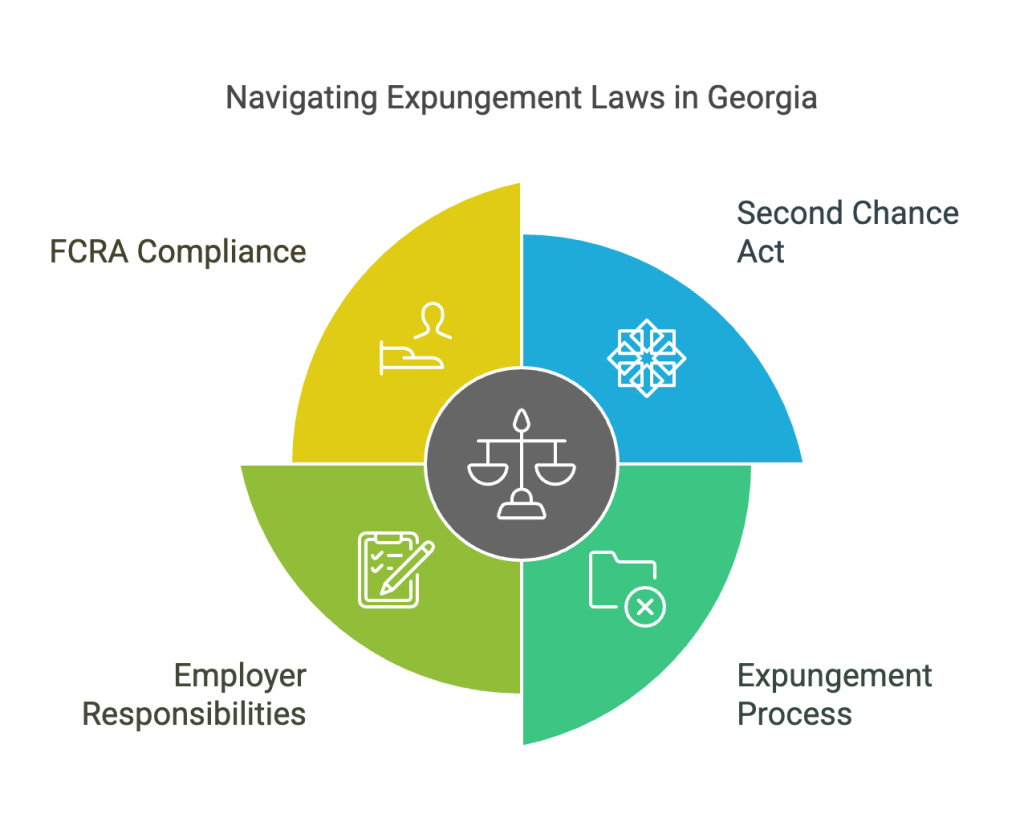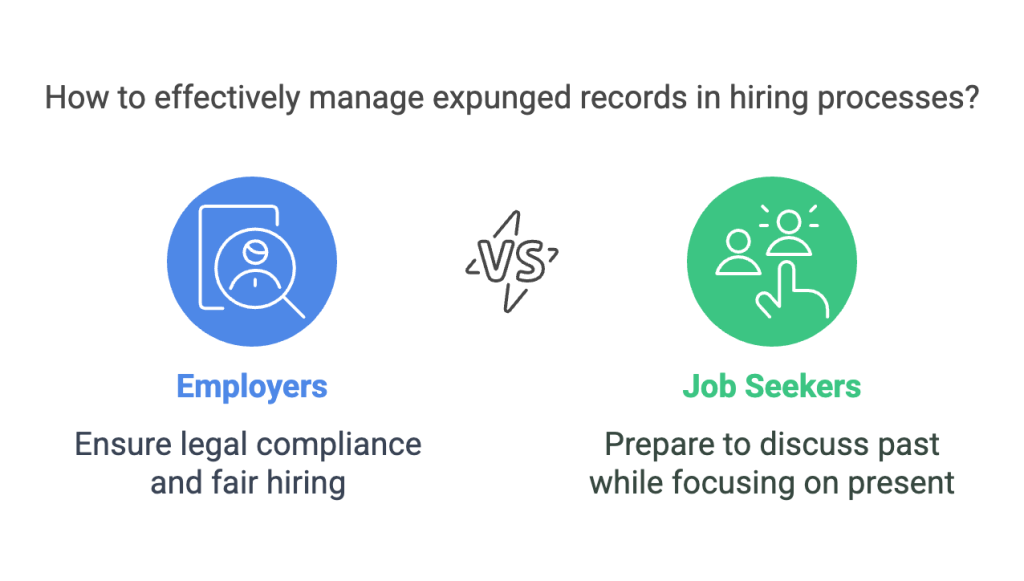Expunged records, a lifeline for many seeking a fresh start, hold varied implications when it comes to employment background checks—particularly in Georgia. For employers, understanding the intricacies of expunged or sealed records is crucial. For job seekers, it's about knowing their rights and opportunities in a landscape increasingly focusing on fairness and second chances. This guide explores the legal frameworks, societal impacts, technological contributions, and practical advice surrounding this topic.
Key Takeaways
- Georgia's expungement laws offer a path for individuals to remove certain criminal records from public view, helping them pursue new job opportunities.
- Employers in Georgia must ensure their background checks comply with state laws, preventing discrimination against applicants with expunged records.
- Second-chance hiring initiatives are encouraging more companies to consider applicants with expunged records, aiming to reduce recidivism and gain diverse talent.
- Technological advances in background screening enhance accuracy by regularly updating information, reducing the risk of outdated records affecting job seekers.
- Both employers and job seekers benefit from understanding expungement laws to maintain a fair hiring environment and leverage the growing trend toward inclusivity.
Introduction
Expunged records are often misunderstood, yet they're a critical element of the background check process in Georgia. An expunged record essentially means that certain arrests or convictions are erased or sealed from public view. Under Georgia law, expungement is intended to protect former offenders, allowing them to move past their prior mistakes without them being visible to potential employers.
There's growing attention to this issue lately. As second-chance hiring initiatives gain momentum, understanding expungement becomes more significant. Employers and job seekers need clarity on how these records should be treated during hiring processes. This is no longer a topic at the fringe of employment discussions; it's a core part of addressing fairness and equity in hiring.
This article seeks to cover the legal definitions and nuances surrounding expunged records in Georgia. It aims to inform both employers and job seekers about their rights and obligations, given current practices and technological advancements in background screening.
Legal Framework Surrounding Expunged Records in Georgia

Georgia's expungement laws have undergone significant changes, especially with the enactment of the Second Chance Act in 2020. This law allows individuals to petition for the expungement of certain misdemeanor and felony charges. For context, expungement means sealing the criminal record from public view, allowing individuals to lawfully claim they have no criminal convictions.
The process is not automatic in Georgia, and it involves meeting specific criteria. These include the nature of the offense, the time elapsed since the conviction, and successful completion of sentencing terms. If granted, the record is removed from public databases, although certain government agencies may still access it.
Employers in Georgia must navigate these laws carefully. They cannot legally ask about expunged records during the hiring process. However, private background check companies might still reveal them if their databases aren't updated. This puts the onus on employers to ensure that their screening procedures comply with state laws and that they respect the rights of applicants with expunged records.
Compliance with the Fair Credit Reporting Act (FCRA) is crucial for employers. This federal law governs how background checks are conducted. Under the FCRA, if adverse action is taken based on a background check, the applicant must be notified and given a chance to dispute the information. This requirement extends to inaccuracies involving expunged records.
Maintaining compliance can protect employers from legal repercussions and foster fair hiring practices. So, how is your organization aligning its procedures with the state and federal requirements? Understanding and implementing these frameworks is key to balancing due diligence with respect for candidates' pasts.
Social Implications of Expungement and Second-Chance Hiring
Second-chance hiring is gaining ground. Companies are opening their doors to individuals with expunged records. This shift is reshaping views on hiring fairness and societal rehabilitation.
Why does this matter? For starters, second-chance programs grant individuals access to jobs they might otherwise miss. This leads to lower recidivism rates and increased economic stability. Employers gain too by tapping into a broader talent pool.
In Georgia, new protections are carving a path for job seekers with expunged records. These laws aim to safeguard applicants from discriminatory practices. They ensure that expunged records are just that—hidden from view. How do these protections play out practically? Employers must respect these barriers when conducting background checks.
Incorporating second-chance hiring isn't merely about legal compliance. It feeds into a larger goal of diversity and inclusion. By considering applicants with expunged records, companies can foster a more inclusive workplace. Diverse teams bring varied perspectives, spurring creativity and innovation.
Yet, how willing are we to allow past mistakes to remain in the past? The push for second-chance hiring encourages us all to reconsider. It's a nudge towards empathy, fairness, and progress. As such, it presents both a challenge and an opportunity for employers and society at large. Do we rise to meet it?
Technological Advances in Background Screening
Technology is reshaping how background checks are conducted. For both employers and job seekers, this evolution offers improvements, especially when dealing with expunged records.
Modern technologies like AI and machine learning are making background checks more accurate. They reduce human error by cross-referencing vast datasets quickly. For applicants with expunged records, this means less chance of old offenses incorrectly surfacing.
Take, for instance, the integration with state databases. With real-time updates, systems can reflect the most current status of an individual's record. This is crucial in Georgia, where recent legal reforms have boosted expungement applications.
Emerging blockchain technology could offer even more transparency and security. By having immutable records, both parties gain confidence in the integrity of the information. This could streamline disputes, which currently bog down the hiring process.
Data from a recent study showed nearly 30% of discrepancies in background checks are due to outdated information. With advancements, these numbers are expected to drop, benefiting job seekers looking for a fresh start and employers striving for fair practices.
Consider how these technologies might evolve over the next few years. Could they provide real-time background updates directly to employers, eliminating third-party checks? How might this enhance or complicate hiring workflows?
As tech continues to develop, both employers and applicants must stay informed about changes. They shape the job market landscape, impacting fairness and transparency.
Balancing Employer Needs and Job Seeker Rights
When dealing with expunged records, employers face a balancing act. You must navigate the complexity of legal compliance while sustaining a fair hiring environment. Georgia law generally keeps expunged records out of your hands, meaning they shouldn't appear in background checks. Ensure your hiring process respects this. Regularly update your screening practices and train HR personnel to understand what expungement means.
From your perspective as a job seeker, honesty is your ally. You might not need to disclose expunged records, but be ready to address any broader questions about your past. Prepare a straightforward explanation that pivots to what you bring to the table now.

For clarity, examine real scenarios. One Georgia-based company revamped its background check policy following an applicant's complaint about outdated records showing up. They realized their screening service hadn't refreshed its database. On the flip side, another company successfully adopted clear hiring policies, resulting in a more diverse workforce without compromising trust.
In each case, communication is critical. Employers, consider how you communicate the background check process. Make sure candidates know what to expect. For applicants, have a plan for if past errors arise again. Keep documentation on hand. Know your rights under Georgia law.
Ultimately, a balanced approach requires cooperation from both sides. When you foster an environment of understanding and transparency, you can handle expunged records fairly. Are you proactive and transparent enough in your hiring approach? As a job seeker, are you equipped to discuss your past if necessary? These questions pave the way for responsible engagement with expunged records.
Conclusion
Expunged records play a crucial role in shaping fair employment practices. In Georgia, understanding their impact on background checks is vital for both employers and job seekers.
By balancing employer needs with job seeker rights, Georgia can achieve a more just job market. The ongoing dialogue between legal frameworks, societal norms, and technological advancements will continue to guide this process, fostering a fairer and more inclusive employment landscape.
Frequently Asked Questions (FAQs)
Do expunged records show up on background checks in Georgia?
Expunged records should not appear on a standard background check in Georgia. The process is designed to remove these records from public access. However, certain government agencies may still have access.
How can job seekers verify their expunged records in Georgia?
You can check your criminal history through the Georgia Crime Information Center’s (GCIC) site. This service allows you to see what remains on your record. Ensure that expunged records are not part of what is accessible.
What industries in Georgia are most affected by expunged records?
Industries like healthcare, education, and finance often perform thorough background checks. An expunged record may not appear but ensuring accuracy is crucial as these sectors usually require extensive vetting.
Can employers in Georgia legally request information about expunged records?
No, they cannot legally request information about expunged records. Employers must respect expungements and should only consider records accessible by standard checks.
How does Georgia’s expungement process differ from other states?
Georgia’s process, often called record restriction, doesn't destroy records but restricts access. Other states may have variations like sealing or complete expungement. Each state sets its criteria based on offense types and waiting periods.
Are employers liable for hiring decisions based on outdated records in Georgia?
Employers in Georgia can face liabilities if they act on outdated or inaccurate information, violating privacy rights. It's important for employers to stay updated on current laws to avoid such risks.
What steps should you take if an expunged record appears in a background check?
Contact both the reporting agency and the court where your record was expunged. Provide documentation to correct this error promptly.
How long does the expungement process take in Georgia?
The process can vary but generally takes several weeks to a few months. Factors affecting this include the complexity of your case and court backlogs.
Who can access expunged records in Georgia?
Typically, only specific government agencies and law enforcement can access expunged records. These records are not open to public view or standard background checks.
What’s the cost of expungement in Georgia?
The cost can vary depending on court fees and whether you hire an attorney. Generally, fees can range from $50 to $150. Check with your local court for precise charges.
Definitions
- Expunged Records - Expunged records are criminal records that are sealed or erased from public view. In Georgia, individuals can petition to have certain charges removed from background checks, allowing them to legally state they have no past convictions. However, some government agencies may still access these records.
- Background Checks - Background checks are screenings employers use to verify a candidate’s history. They pull data from multiple sources, including government and private databases. If these databases are outdated, expunged records may still appear, creating challenges for job seekers.
- Fair Credit Reporting Act (FCRA) - The Fair Credit Reporting Act (FCRA) is a federal law that regulates background checks for employment. It requires employers to inform applicants if a background report influences hiring decisions. If an expunged record appears incorrectly, job seekers have the right to dispute the information.
- Second-Chance Hiring - Second-chance hiring refers to recruiting individuals with past criminal records, including those with expunged offenses. Companies that adopt this approach expand their talent pool while allowing individuals to move forward without past mistakes limiting job prospects.
- Compliance - Compliance means following legal requirements and industry regulations during hiring. Employers must ensure background checks align with federal laws and Georgia’s expungement rules. Failing to do so can lead to legal consequences and discrimination claims.
Still have questions?
Get in touch with our team today for a personalized demo and discover how our tailored volume pricing and packages can drive results for your business!
How useful was this page?*
Note: your comments are anonymous. We use them to improve the website. Do not include any personal details.
Visit our FCRA Compliance Tool or leave a message here if you need a response.
From the blog Explore the GCheck Content Hub

Background Screening for Remote Employees: A 2026 Operational Guide
27 Jan, 2026 • 16 min read
What Drugs Does a 10 Panel Test Detect? 2026 Guide for Workplace Screening
27 Jan, 2026 • 21 min read
Level 1 vs Level 2 Background Checks: A Strategic Framework for 2026 Hiring Decisions
27 Jan, 2026 • 19 min readThe information provided in this article is for general informational and educational purposes only and should not be construed as legal advice or a substitute for consultation with qualified legal counsel. While we strive to ensure accuracy, employment screening laws and regulations—including but not limited to the Fair Credit Reporting Act (FCRA), Equal Employment Opportunity Commission (EEOC) guidelines, state and local ban-the-box laws, industry-specific requirements, and other applicable federal, state, and local statutes—are subject to frequent changes, varying interpretations, and jurisdiction-specific applications that may affect their implementation in your organization. Employers and screening decision-makers are solely responsible for ensuring their background check policies, procedures, and practices comply with all applicable laws and regulations relevant to their specific industry, location, and circumstances. We strongly recommend consulting with qualified employment law attorneys and compliance professionals before making hiring, tenant screening, or other decisions based on background check information.

